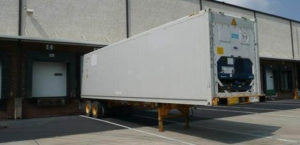 Customs commissioner Rey Leonardo Guerrero directed all customs officials to carefully examine all imported reefer containers to ensure pork and pork-related products that are potential carriers of a new strain of swine flu virus do not enter the Philippines.
Customs commissioner Rey Leonardo Guerrero directed all customs officials to carefully examine all imported reefer containers to ensure pork and pork-related products that are potential carriers of a new strain of swine flu virus do not enter the Philippines.
Chinese researchers recently discovered a new type of swine flu that can infect humans and has the potential to cause a future pandemic, according to a study published by scientific journal Proceedings of the National Academy of Sciences on June 29. The G4 virus is genetically descended from the H1N1 swine flu that caused a pandemic in 2009, and possesses “all the essential hallmarks of being highly adapted to infect humans,” the study said.
In a statement, BOC said that upon arrival of vessels containing agricultural and food products, boarding formalities are strictly conducted by customs and quarantine officers of the Bureau of Animal Industry (BAI), Bureau of Plant Industry and Bureau of Fisheries and Aquatic Resources.
Food imports such as meat products undergo initial examination by the Department of Agriculture together with BOC examiners prior to release from the ports. After this initial examination, the reefer container is sealed by BAI for 100% examination by the National Meat Inspection Service in its accredited storage warehouse.
Further, BOC recently launched guidelines for its Electronic Tracking of Containerized Cargo System (E-TRACC System) to cater to examination of reefer importations in various BOC ports nationwide.
E-TRACC System, which was launched on May 1, is a Web-based system that enables real-time monitoring of inland movements of containerized goods using global positioning system (GPS)-enabled tracking device to secure transport to intended destination.
Establishment of the E-TRACC System is embodied in Customs Memorandum Order (CMO) 04-2020, signed by Guerrero on February 4, 2020.
CMO 04-2020 implements Customs Administrative Order No. 15-2019, which covers the movement within customs territory of foreign goods for outright exportation, warehousing, and those admitted to Free Zones, as well as the transfer of goods from customs facilities and warehouses.
BOC earlier said the system is scheduled for roll out initially at Manila International Container Port, Port of Manila, and Batangas in June, followed by Cebu, Davao, Subic, and Clark in July. Full implementation of the system in all ports is expected by August 2020.





